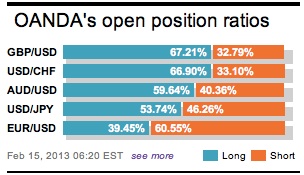All investors seek is clarity. How difficult can that be? Despite being on the same side, sometimes it’s been near impossible to get the 17-member Euro-zone policy makers to sit down and agree. So achieving consensus from the G20 meeting commencing today and ending tomorrow in Moscow is a tall order.
At stake is how much to support Japan’s use and interpretation of Abenomics to boost its economy from a decade and a half of deflation without signaling support for a weaker Yen. The danger of favoring one currency over another usually hurts neighboring exporters. Ever since Shinzo Abe and his policies arrived on the scene, yen has managed to depreciate 12% outright. How does one stop the hurt? By fighting loose monetary stimulus with a ‘trade war’ and something the policy makers are trying to avoid. By Sunday, investors should be in a position to understand how comfortable all the other members are with the new weaker yen landscape.

Earlier this week, the remaining G7 members provided opaque clarity. They rallied together around a pledge not to target exchange rates only, but were divided over its meaning for Japan. It’s important for the G7 to be showing solidarity. They are coming up against the “new” world order of emerging markets this weekend. One legacy of the 2008-09 financial crises is a low growth world, typified mostly by the cyclical maturing economies of the G7 members. Their earlier communiqué has put currencies at the center of the global policy debate, which highlights the sensitivity of policy makers to exchange rates.
According to the draft of a statement the group intends to release Sunday, the G20 members will pledge to ensure that monetary policy is focused on price stability and growth, rather than weakening their currencies. That is the obvious, but it’s the sofar unsaid that this market is worried about.
Sterling remains on a long leash after UK retail sales unexpectedly fell last month (-0.6%). It’s not a surprise to see the weather being blamed again. This time heavy snowfalls managed to hit sales of food and fuel, as many stores “shut up shop.” This morning’s headline does not provide a warm and fuzzy feeling that the UK economy will return to growth in Q1 after contracting -0.3% in Q4. The January print was -0.6% lower, y/y. Many had expected retail sales to rise +0.6% on the month and +1%, y/y.

The Euro-zone’s import (-3.0%) and export (-1.8%) business declined in December, again highlighting the fragility of consumer demand and emphasizing the weakness in the regions manufacturing base. The supposed economic savior, the European consumer, continues to show signs of falling disposable incomes due to rise in prices of staples (food and energy). This data reinforces the growth concerns highlighted by the GDP reports earlier in the week. It’s a tight vicious circle that is not even close to being broken. No jobs and no income result in no spending!

This FX market seeks guidance. Many positions have been pared or even liquidated ahead of the G20’s communiqué. It’s expected that if everything goes according to plan then the general market themes of late should continue. The EUR would likely outperform GBP, while AUD comes under pressure. JPY liquidity should be the main driving force to push the single currency and mighty dollar higher. The markets are testing the lows after four day’s of yen strengthening. All the yen is looking for the green light on Sunday night.

Other Links:
EUR Unglued By Ugly GDP Assault
This article is for general information purposes only. It is not investment advice or a solution to buy or sell securities. Opinions are the authors; not necessarily that of OANDA Corporation or any of its affiliates, subsidiaries, officers or directors. Leveraged trading is high risk and not suitable for all. You could lose all of your deposited funds.


